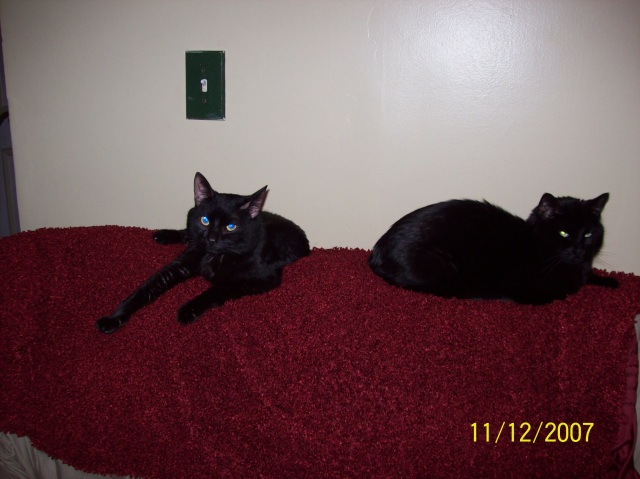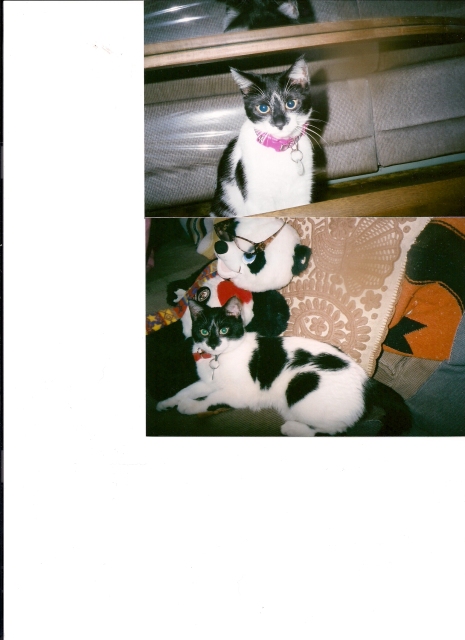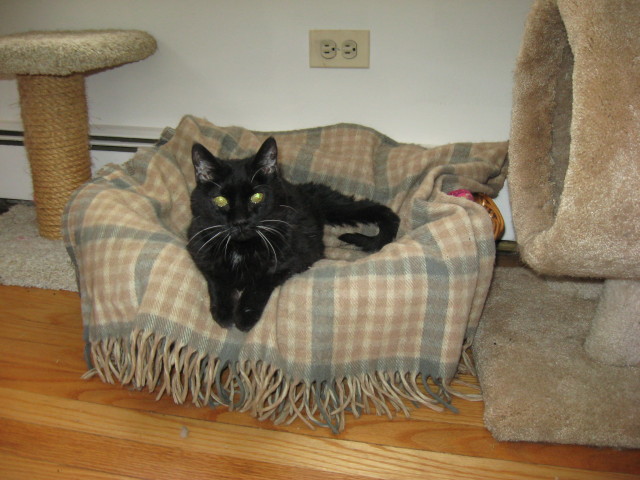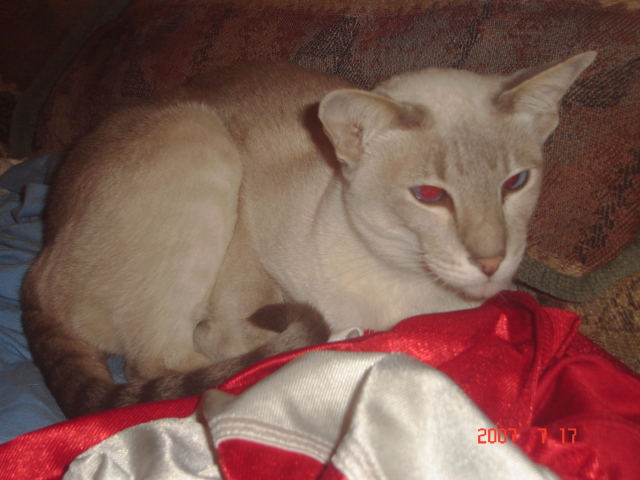QuestionQUESTION: I have 3 ferol cats that live under my 100 year old home. They actually climb under the house & climb up into/under the floor joists. I had one female who has given birth to 5 kittens. We are not sure if they were brought into the house or she gave birth IN the house but we discovered them in an unused closet on a blanket that was in there. One died before we found them. The mom is severely distressed & has actually grabbed two & climbed a tree w/ them & jumped on our next door neighbors house w/ them. A couple of hours later I actually saw it fall about 12 feet & land on concrete. I was outside talking on the phone & just happened to be looking in that direction. I ran & got it finding a second cat that had fallen as well. I am bottle feeding them now. My question is, What advice can you give me concerning bottle feeding? I have read this advice from you > http://en.allexperts.com/q/Cats-1606/feral-kittens.htm
I lerned alot just reading that!. Any help would be appreciated, Thanks, Sharon
ANSWER: Hi Sharon. Do you have any estimate on how old the babies are? Here is a way to estimate their age roughly:
Umbilical cord still attached: under a week old
Eyes still closed: under ten days old
Eyes open, have a couple teeth but ears are still folded shut: 2-3 weeks
Ears are open, kittens can urinate on their own: 3-4 weeks
The main reasons it's important to tell the kittens' ages is because they are unable to maintain their own body heat until three weeks of age and because they need to be fed much more frequently when they're only a couple weeks old than when they're, say, four weeks. If you suspect the babies are only a couple weeks old, they really should be fed every 2 hours, night and day. I know this seems excessive, but back when I was feeding my newborns every four hours, as suggested on the formula packaging, I was losing quite a few babies. Then a veterinary technician who raises dozens of litters each year gave me her feeding guidelines, which, to my surprise, required feeding one and two week old kittens every two hours! It sounded crazy, but natural moms feed their kittens on this schedule, so I thought maybe it did have some merit. I tried it out, and she was right - I haven't lost a kitten since. I drop feedings down to every three hours at three weeks and four hours at four weeks. I begin to add in solid foods at this age, and the kittens go six hours between feedings at five weeks. The kittens have 3 bottles a day until 8 weeks and then one bottle a day until 12, if they remain interested.
Formula should always be at body temperature (100 degrees for them) to prevent digestive upset. Depending on how old the kittens are, meals may be as small as 5 cc's for a 3-day-old kitten to 30 cc's for a four-week-old kitten. Don't forget to burp the babies by gently patting their backs after meals.
If the kittens are not yet urinating and defecating on their own, you will need to stimulate them to move their bladder and bowels using cotton balls moistened with warm water to massage the genital area in a gentle circular motion after each meal. Kittens generally have no problem urinating, but defecation can take some effort. Try for several minutes, and if no stool is produced, try again after the next meal. The kittens should have a bowel movement at least once a day. Kittens who switch to formula after being on natural milk have a tendency to become constipated, so if you haven't seen a bowel movement in 2 days, you should consult a vet.
Kittens will begin urinating on their own around 3 weeks and defecating shortly thereafter. They learn what the litter box is surprisingly quickly, so I start stimulating them over a shallow tray of litter as they get close to this age, then allow them to poke around in the litter a little. However, be sure to only use a digestible litter such as Swheat Scoop (wheat) or World's Best (corn). No clay clumping cat litter, as kittens tend to "taste" everything as part of the exploration process, and this litter could cause stomach blockages.
The kittens should be kept in a room free of air conditioning and may need access to a heating pad. I keep my babies in a box with a heating pad wrapped in a towel, set on low to medium heat. There should be enough room in the box for the kittens to move off the heating pad if they feel too warm.
Good luck!
Jessica
---------- FOLLOW-UP ----------
QUESTION: My gosh thank you so much! They still have small umbilical cords. They are crying & squealing alot. :) I bought a bottle w/ 2 nipples feeding kit at the nearest pet supply & some formula & when they start crying I've been feeding them today & they go back to sleep. It holds 2 ounces. They took it all today. The third time & fourth time they figured out how to suck on the bottle. While I'm holding a couple they go to sleep still on the bottle. We were concerned about how much (cc's etc.) they needed. We turned the lights out & they've been quietly sleeping for about an hour. I'll take your advice. Thanks alot! I have alot of experience w/ dogs having worked at Pet Lodge Pet Resort in Alpharetta, Ga. Cats I need to study. What an experience. The mom is sitting at our front door now for 5 hours looking in. The babies are quiet sso she has settled down too. When we trap her in the house she climbs our window panes all the way to the ceilings. Curtains too. I am not going to attempt to grab her. She is totally wild raised. She got into our box today, grabbed a baby in her mouth & proceeded to try & jump straight through a glass window pane. Full speed. They both might have a headache from that , poor things. We are making an area in an unused room for them & we will keep the door shut. I guess we can expect the mom to continue to be like this for weeks yes? & on? Yes? Thanks so much. Shouldn't we totally seperate they from each other completely? We are pretty sure there is no hope to get the mom to be any way other than the way she is now. Thanks, Sharon
ANSWER: The absolute ideal situation would be to live-trap mom and set her up with the babies in a small room without windows, or a cage covered with blankets on three sides until she settles down, and allow her to raise the babies until weaned. During this time, you would need to take the babies out for cuddle time several times daily to ensure that they would grow up completely socialized despite mom's wild nature. Once weaned, mom could be spayed and released, and the babies could be placed in homes. There are a few ferals who get very defensive over their babies, and you have to get creative about how to get into the cage to remove the babies without being swatted. But most mothers tolerate it quite well when their babies are handled, especially once they see that you return them safely each time.
Anytime there is a possibility of keeping the mother involved, I recommend it. This is the best case scenario not only for mom's emotional well-being and the feral popultion but also for the kittens' health. They are missing out on important antibodies in the breast milk, and they will miss out on some valuable cat-to-cat socialization lessons that mom will teach. However, I know that not everyone has room in their home for a feral cat, nor do they have the nerves to deal with one. And if there is any possibility that mom will disappear with the kittens, then it's better to just keep her separated from the completely.
So my best advice is, if you can secure a room or cage so that it's escape-proof, I would love to see mom stay involved with this litter. This would be just as important to their development as human contact is. Orphans can be a little difficult to get onto solid foods and to litter train. You can still bottle-feed the babies part-time to maintain your bonding with the little ones. If there is no way to keep mom with kittens in a safe area, then I would separate them completely to prevent her from wandering off with them and also to help her move on emotionally. Most mothers will search for their lost kittens for a couple of weeks, but some persist for longer. Ideally, try to live-trap her and have her spayed. Some vets may offer free or discounted services or be able to refer you to a trap-neuter-return organization that could help you.
---------- FOLLOW-UP ----------
QUESTION: Well we cleaned out a room & have the mom trapped w/ the kittens. They are really quiet for 2 hours now. She tried o climb under the door for about 5 minutes then went into the closet where the babies are. I have a concern about will she teach them not to like us? We will obviously need to interact w/ them. What are the chances we can adopt them out? Thanks for all your help!. Thank you, Sharon
AnswerThat is a very valid concern. The good news is that regardless of mom's disposition, the kittens will be open to human interaction, as long as you maintain contact with them every day. The babies will be most impressionable between the ages of 2 and 5 weeks, so it's important that consistent cuddling take place every day during that time. However, even before the age of two weeks, studies have shown kittens handled by people open their eyes younger and will leave the nest sooner. The more the kittens are handled, the friendlier they will be. For the first few weeks, try to hold them for a few minutes several times a day. By several weeks old, hopefully they can be joining in most of what you do. As long as you keep up daily contact with the babies, chances are 100% you will be able to adopt them out.
As for adopting the mother out, chances are lower, as you already suspect. Sometimes we get a nice surprise, and feral moms really calm down tremendously as we have them confined to raise their litter. At times, we even find they had once been domesticated and are just very frightened strays. These cats actually calm down nicely once the initial terror of being confined to a house wears off! In fact, my sweetest cat was a feral who tried to climb the walls and defecated out of fear when she first came to me. After 3 weeks of confinement, she seemed like a whole different cat. I think you should see how she does as she gets closer to weaning her litter. If she's still very tense and afraid, I would encourage you to see about that trap-neuter-return organization that may at least be able to help you get her spayed.

 Cats continuing to pee on bed(s)
Question
Our cats...Payten and
I have read the
Cats continuing to pee on bed(s)
Question
Our cats...Payten and
I have read the
 Recently Adopted Cat
Question
CREAM PUFF
Hello !
Hoping all is well.
Recently Adopted Cat
Question
CREAM PUFF
Hello !
Hoping all is well.
 cat vitamins; valerian feline;; NuVet health pets; wholistic Feline;
QuestionHi, I have a mostly indoor cat - sh
cat vitamins; valerian feline;; NuVet health pets; wholistic Feline;
QuestionHi, I have a mostly indoor cat - sh
 Senile Cat?
Question
Chloe
I have a cat thats about 18 1/2 years ol
Senile Cat?
Question
Chloe
I have a cat thats about 18 1/2 years ol
 Siamese tracks feces around the house
Question
Dirty Foot
I recently adopted a wonderf
Siamese tracks feces around the house
Question
Dirty Foot
I recently adopted a wonderf